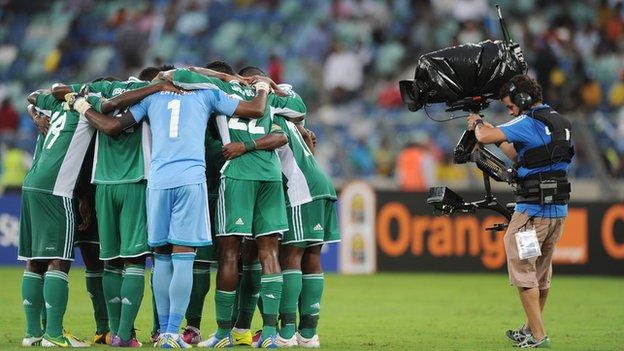Egypt and Caf locked in TV rights row
- Published

A Nigerian huddle in the 2013 Africa Cup of Nations is caught on camera.
A billion-dollar broadcasting deal signed by the Confederation of African Football (Caf) and a French media company, Lagardere, in 2015 has come under scrutiny in Egypt, where Caf is based. The local competition authority has asked the prosecutor's office to investigate whether the tender for the contract had been opened to free and fair competition as required by Egyptian competition law. The deal covers rights for African football, including the flagship Africa Cup of Nations, from 2017-2028.
Q: What is the dispute about?
Ostensibly, the Egyptian Competition Authority (ECA) has told Caf to cancel its contract in Egypt and reopen it for tender. In a press release, the ECA says the measures it is keen to impose on Caf include "immediate termination of the Caf/Lagardere agreement within the Egyptian market".
The ECA also says it wants Caf to award broadcasting rights for the 2017 Nations Cup, which starts in Gabon on Saturday, to "another competitor alongside beIN" - the Qatar-based sports broadcaster who bought the pan-regional rights off Lagardere following the June 2015 deal.
"These orders are legal obligations binding Caf, and failure to fully comply may subject the entity to further private damages claims from injured parties in addition to heavy criminal fines," said the ECA statement.
In its heading, the press release said it was referring Caf President Issa Hayatou to the Egyptian prosecutor but the Cameroonian was not mentioned anywhere else - either by name or title - in the statement.
Q: What has Caf had to say about the allegations?
Caf has rejected all the ECA's claims.
Firstly, it says the deal does "not contravene national or supranational legislation" before adding that it received 'no mention of any prosecution against the president of Caf' when contacted by the ECA.
Caf, which reiterated its "compliance with procedures" in a statement on Friday,, external says it renegotiated with Lagardere when its previous deal, which ran from 2010-2016, with the company expired - as per the terms of their initial agreement.
Q: So what will happen for this year's Nations Cup?
Given the short notice, the ECA says the current deal can continue for the 2017 finals. However, as already said, it has also ordered Caf to grant broadcasting rights in the Middle Eastern and North African region to another company alongside beIN for this month's tournament in Gabon.
Q: Who currently holds the rights in Africa?
The Lagardere agency has parcelled up its global rights both continentally and pan-regionally.
In sub-Saharan Africa, these have been sold to the African Union of Broadcasting for further redistribution. In North Africa and the Middle East, coverage has been granted to beIN Sports, which is allowed to broadcast in Egypt even though its parent company Al Jazeera is not.
BeIn broadcasts by satellite and operates on a subscription basis, and the ECA wants another competitor alongside it "in order to avoid depriving those who already subscribed with beIN channels from watching the games, but also to allow the rest of consumers to receive the right to watch the tournament under competitive conditions".
It is understood that terrestrial viewers among Egypt's population of 84 million greatly outnumber those who subscribe to beIN Sports.
Q: Was this not the case for previous Nations Cups?
In recent times, it has been.
The main difference is that Egypt - after winning their third straight title in 2010 - missed the tournaments in 2012, 2013 and 2015 as the national team suffered as a result of the country's political revolution.
Now that the Pharaohs, record seven-time winners of the competition, are back, the issue has been brought into sharper focus.
Q: Can Egypt buy rights from beIN to show matches on free-to-air terrestrial TV?
Yes it can. However, the views of interested parties diverge here once again.
Egyptian agency Presentation has told the BBC it approached beIN Sports to buy the rights in order to pursue such a plan. Founded in 2008, the company came to prominence last October when it announced it had bid $1.2 billion for the rights that Caf had sold to Lagardere more than a year earlier.
Qatar-based BeIn is adamant that no such approach has been made.
On Friday, a beIN spokesperson - in a statement to the BBC - "categorically confirmed that no offer had been received from Presentation, either in recent days or at any time since the pan-regional rights were awarded by Caf to beIN SPORTS in June 2015".
Q: What will happen next?
It's largely impossible to know until Egypt play their first match of the tournament on Tuesday - against Mali in Port-Gentil.
In 2013, Egypt's state broadcaster - the ERTU - broadcast a key Egypt World Cup qualifier against Ghana in breach of broadcasting rights, leading to a hefty fine. This was because ERTU had not agreed a deal with beIN, the rights holder, to show the game. Should such a scenario repeat, the prospect of legal action is very likely.
Longer term, the next step is also in the hands of Egyptian authorities.
Caf, beIN and Lagardere are all confident of their legal position - with the latter, who are not involved in the reference by ECA, saying in a statement that "allegations that the agreement breaches local Egyptian competition laws are wholly unfounded and we have clear legal advice to that effect".
Q: Could this row force Caf to relocate from its long-standing headquarters in Cairo?
A curious part of the ECA's initial press, external release came when it commented "on the possibility of moving the Caf headquarters to a location outside the Egyptian borders as a result of the ECA intervention".
However, in a statement to the BBC, Caf said that such a move "is not part of the Caf agenda" and that "relocation has not been discussed".